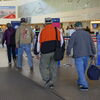Screen time | Getting a product in a movie or on TV often means spending big bucks, but some Maine companies have found the route to stardom doesn't cost a penny
Fans of Maine's oldest brewpub who happened to watch the second episode of the Showtime television series "Brotherhood," which aired in July, probably noticed a familiar sight: A neon Gritty McDuff's sign, Gritty's tap handles and cases of its Vacationland Ale displayed clearly in a scene taking place in a bar.
National exposure like this is a coup for a relatively small New England microbrewery, since large companies pay anywhere from tens of thousands to several million dollars to get their products written into movie scripts or inserted into television shows — even into video games, books and songs. But the deal basically fell into Gritty's lap, at no charge, after the brewery's iconography was handpicked by members of the set design crew working on the Showtime series.
More and more companies are turning to product placement to get their product into the public eye. The drive for this type of embedded advertising is fueled by a number of factors, including advertisers trying to reach an audience armed with commercial-skipping technology like TiVo. Global product placement spending in TV, film and other media surged 42.2% to $2.2 billion in 2005 and is expected to climb another 38.8% to $3.1 billion in 2006, according to Stamford, Conn.-based media research firm PQ Media. The goal of advertisers, according to PQ Media President Patrick Quinn, is "to get right into films and marry the marketing message with the content."
But while product placement may be a viable marketing strategy for large corporations, the majority of Maine companies don't possess the means to support that kind of advertising. For a small company like Gritty McDuff's, getting products placed on a national TV show like "Brotherhood" is relatively uncommon, says Quinn. In fact, Quinn can't even offer a ballpark figure as to how much that kind of exposure would cost Gritty McDuff's. "It's hard to gauge something like that," says Quinn. "In the United States we're still trying to come up with a cohesive value and measurement system and standardization in the industry."
Gritty McDuff's first TV role was in the two-part HBO series "Empire Falls" in 2005, and it was a role the company landed out of pure coincidence, according to Thomas Wilson, Gritty's marketing manager. What wasn't a coincidence, however, was the call he received last year from the production company making "Brotherhood." Many of the set design crew working on the new Showtime series also had worked on "Empire Falls." They remembered the Gritty McDuff's sign when they were looking for props to complete scenes for "Brotherhood," a show that revolves around two Irish-American brothers — one a politician, the other a gangster — in Providence, R.I.
In short order, Wilson got a call from someone at the production company. "He gave me a short synopsis of the story, told me what was going on, and then said we would love to have Gritty's in the show," Wilson says of that initial conversation.
But Wilson was a skeptical and asked how much it would cost Gritty's to get its name in the show. The answer? Not a cent, largely because the show was new and hadn't built an audience — or, by extension, a list of companies wanting exposure in its storylines. The brewery sent a vanload of signage, packaging and tap handles to Providence, where the show was being filmed. A few months later, Gritty's received the tap handles in the mail, but didn't hear anything else until the show aired this July. "We're all over it," Wilson says of the company's appearance in the show. "It's unbelievable."
Despite the fact that Quinn says there are six- and seven-figure product placement deals being posted around the world, Gritty's experience with free exposure is actually more common for Maine business — including D.L. Geary Brewing Co., Thos. Moser Cabinetmakers and Angela Adams — that have had success getting their products on the big screen or TV without paying a cent. Often, it's product placement by chance, like Gritty's finding itself in "Empire Falls," while other products — like Thos. Moser furniture or Angela Adams rugs — get chosen because they have the right look for a particular movie or show. "I think it's an opportunity for Maine companies to jump ahead of the curve," says Bob Heiser, assistant professor of marketing at the University of Southern Maine School of Business. "It's a way for them to get placed and to market themselves without the extra cost of working with a big production company to make a traditional commercial."
A plug for authenticity
For film and TV production companies, including the neon signs and tap handles of Maine-based breweries like Gritty McDuff's and Geary's, which also appeared on "Empire Falls," is a way to add some local color to a scene. "On a large scale, [companies] like Coca-Cola and Budweiser pay big time for the privilege of product placement," says David Geary, owner of Portland-based D.L. Geary Brewing Co., which a few years ago had its beer featured in the Stephen King film "Dreamcatcher." "But we appeal to their need for authenticity rather then their greed."
Even though neither Gritty McDuff's nor D.L. Geary Brewing distribute their beer nationally, the wide exposure can't hurt. And while they hear from people who saw their products on TV, neither Wilson nor Geary can gauge whether the exposure has increased sales. "I do know this," Wilson says. "If you get your name or your image into a show somewhere, it helps."
And for those Maine companies who do have a national presence, the benefits can be even greater. Angela Adams, the Portland-based designer, has had her rugs, notebooks and bags on several TV shows, from "Today" and "The Bachelorette" to "Queer Eye for the Straight Guy" and "The Apprentice."
Sometimes, Adams provides the products for free, other times the products are bought outright by the production company or rented from a retailer. Adams has never paid for the placements, but says she's been willing to giving away a $1,600 rug because it helps create awareness for the Angela Adams brand. Anecdotally she's seen the popularity of certain products increase after a particular show has aired. "On 'The Bachelorette' somebody passed out on our rug and we were right on camera for a minute," Adams says with a laugh. "I think that really helped us.
Creating buzz
While Gritty McDuff's TV exposure has so far been due to luck, the experience has "planted the seed," Wilson says. As the company expands its distribution — in the past year it's pushed into Massachusetts, New Hampshire, New York and Vermont — product placement may build its name recognition to ease the transition into new markets and create buzz for the brand, Wilson says. "Even though they're in California," Wilson says, "if they're watching "Brotherhood" and they see our logo, or they see our tap handles… when the time comes that we do get to their state, I'm sure it will help."
Product placement also helps drive consumers to ask retailers for the products, says Nancy Artz, a professor of marketing at the USM School of Business. "That's something called the consumer pull strategy," Artz says, "getting people to drive demand."
In fact, Gritty McDuff's recent expansion into New York was a result of press it received from its appearance in Brotherhood," as well as a nationally distributed article written by the Associated Press that charted the rise of craft brewing and singled out Gritty McDuff's. "Our distributor in Massachusetts was expanding into New York state," Wilson remembers, "and when they heard about all this press they came back and said, 'You guys are on fire. Combined with the press you're getting and the marketing that you're doing… we need to take you to New York right now.'"
Since the brand's appearance on "Brotherhood," Wilson has received calls from a marketing company in New York about taking Gritty McDuff's to the next level when it comes to product placement, like getting the company's name or products written into the script from the beginning, rather than being an afterthought by the set designers. Of course, that type of placement usually costs money. Wilson says the company's not ready to pay for placement quite yet, but is keeping its options open in case an opportunity comes along. "I think that's part of what we learned from this experience with 'Brotherhood,'" Wilson says. "They had an edgy, cool show, we're an edgy, cool beer, so it was a good match. And I think that's what you have to look for — you have to look for the right opportunity."









Comments